Bitcoin
Texas Leaders Worry That Bitcoin Mines Threaten to Crash the State Power Grid
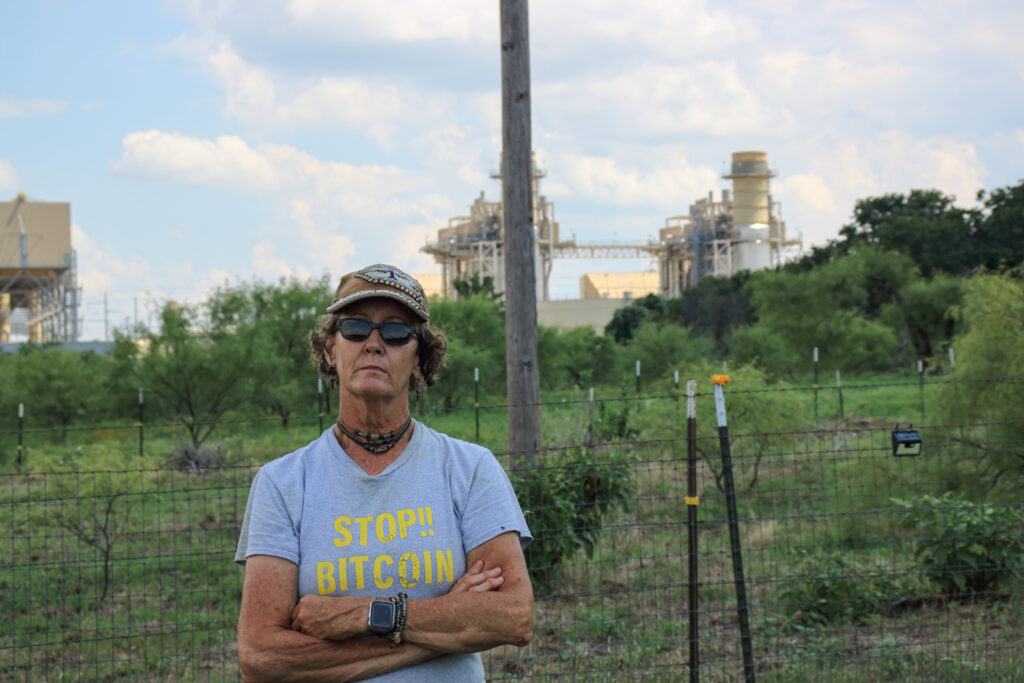
GRANBURY, TEXAS — Cheryl Shadden cannot sleep. The 61-year-old nurse, who works at hospitals giving patients anesthesia, says she is kept up at night by the nonstop mechanical whir of fans spinning to cool tens of thousands of computers.
Shadden lives in Granbury, Texas, about 40 miles southwest of Fort Worth, with her seven dogs, six horses, six cats and a parrot. In 2022, after 23 years in the area, Shadden got a new neighbor: a 300-megawatt Bitcoin facility, referred to as a “mine,” where computers run around the clock to help maintain a global network of transactions in the cryptocurrency.
“Nobody in their right mind would live here,” Shadden said. “My windows rattle. The sound goes through my walls. My ears ring, 24/7.”
Since the facility opened, Shadden said her animals are restless, and some of her dogs have pulled out their own fur. In late June, Shadden went to a doctor to get her hearing examined, and tests found she had suffered permanent hearing loss. She believes her animals’ behavior and her hearing loss were caused by the noise from the Bitcoin mine.
Cheryl Shadden stands in her backyard with several of her Great Pyrenees dogs. Credit: Keaton Peters/Inside Climate News
Noise pollution is not the only reason that Bitcoin mining may be keeping Texans up at night. The mine owned and operated by Marathon Digital is part of a growing tide of cryptocurrency mining facilities opening across the country, but especially in Texas, where taxes are low, land is plentiful and mining companies can take advantage of the state’s deregulated energy market. As electricity demand rises, ordinary Texans can end up paying the price on their monthly utility bills.
Bitcoin is the largest and best known cryptocurrency, first devised in 2008 as an electronic payment system that cuts out middlemen like banks and credit card companies, with all transactions managed by a decentralized network of Bitcoin users. A Bitcoin, currently worth about $58,000, can be purchased with dollars at a Bitcoin exchange, like Coinbase. To buy something with Bitcoin, a buyer sends the currency from a digital wallet to the seller’s digital wallet.
But it’s not that simple. A computer algorithm assigns each transaction a unique random identifying code, which must be guessed in order to validate the transaction. Bitcoin “mining” comes when companies operate powerful computers day and night running endless series of random numbers before hitting upon, or guessing, the correct code. Every time a Bitcoin miner’s computer successfully guesses a transaction code, the miner receives 3.125 newly minted Bitcoins (worth about $181,250 at the current price), which is the fee for helping maintain the network and keep it secure.
Explore the latest news about what’s at stake for the climate during this election season.
The system is designed so that it takes an average of 10 minutes for a Bitcoin miner somewhere in the world to guess a code and verify a transaction. But as Bitcoin miners add computing power to verify more transactions, the system’s algorithm makes the process harder by generating longer codes, creating what has been called an energy arms race, requiring larger and larger amounts of electricity to run the computers.
Texas is now home to 10 of 34 large Bitcoin mines.
During cold spells or heat waves, Texans are commonly called on to conserve power. For example, in August 2023, the state’s grid operator issued eight conservation requests, asking the public to reduce electricity use to help prevent an emergency in which rolling blackouts could be required. Increasingly, Texas lawmakers are worried that energy-hungry mines will make it harder to keep the lights on across the state.
“They’re going to put our grid at risk because of the power they’re drawing,” said state Sen. José Menéndez (D-San Antonio) at a public hearing on June 12.
For more than six hours, senators on the Business and Commerce Committee pressed grid operators, public utility commissioners and representatives from industries, including manufacturing, oil and gas and cryptocurrency. Chief among legislators’ concerns was the massive growth in energy demand on the state’s main electrical grid, which is estimated to go from a peak demand of about 85,000 megawatts last year to 150,000 megawatts in 2030, according to estimates from the Electric Reliability Council of Texas.
Following the hearing, in a post on social media, Lt. Gov. Dan Patrick declared, “it can’t be the Wild Wild West of data centers and crypto miners crashing our grid and turning the lights off.”
Power Plant Loans and “Large Flexible Loads”
Currently, cryptocurrency mining — mostly for Bitcoin — can draw up to 2,600 megawatts of power from the grid operated by the Electric Reliability Council of Texas, ERCOT’s senior vice president, Woody Rickerson, told senators. That’s about the same amount of power used by the city of Austin, and another 2,600 megawatts of mining is already approved to connect to the grid. Even more Bitcoin mines are expected to come to Texas in the near future.
ERCOT estimates that as much as 43,600 megawatts of additional electricity demand will be added to the grid by 2027 from facilities classified as “Large Flexible Loads” requiring more than 75 megawatts. In a statement to Inside Climate News, ERCOT said, “currently, the crypto mining industry represents the largest share of large flexible loads seeking to interconnect to the ERCOT System.” Data centers for artificial intelligence and facilities for producing hydrogen from water through electrolysis also make up part of the large flexible loads.
To meet the major growth in demand, driven in large part by Bitcoin mining, Texas is turning to natural gas power plants, with taxpayers providing the down payment. In 2023, the Texas legislature passed a loan program, later approved by voters as ballot Proposition 7, to give low-interest loans to companies to build or expand power plants. At first, the Texas Energy Fund will have $10 billion to award, after receiving more than $39 billion in requests.
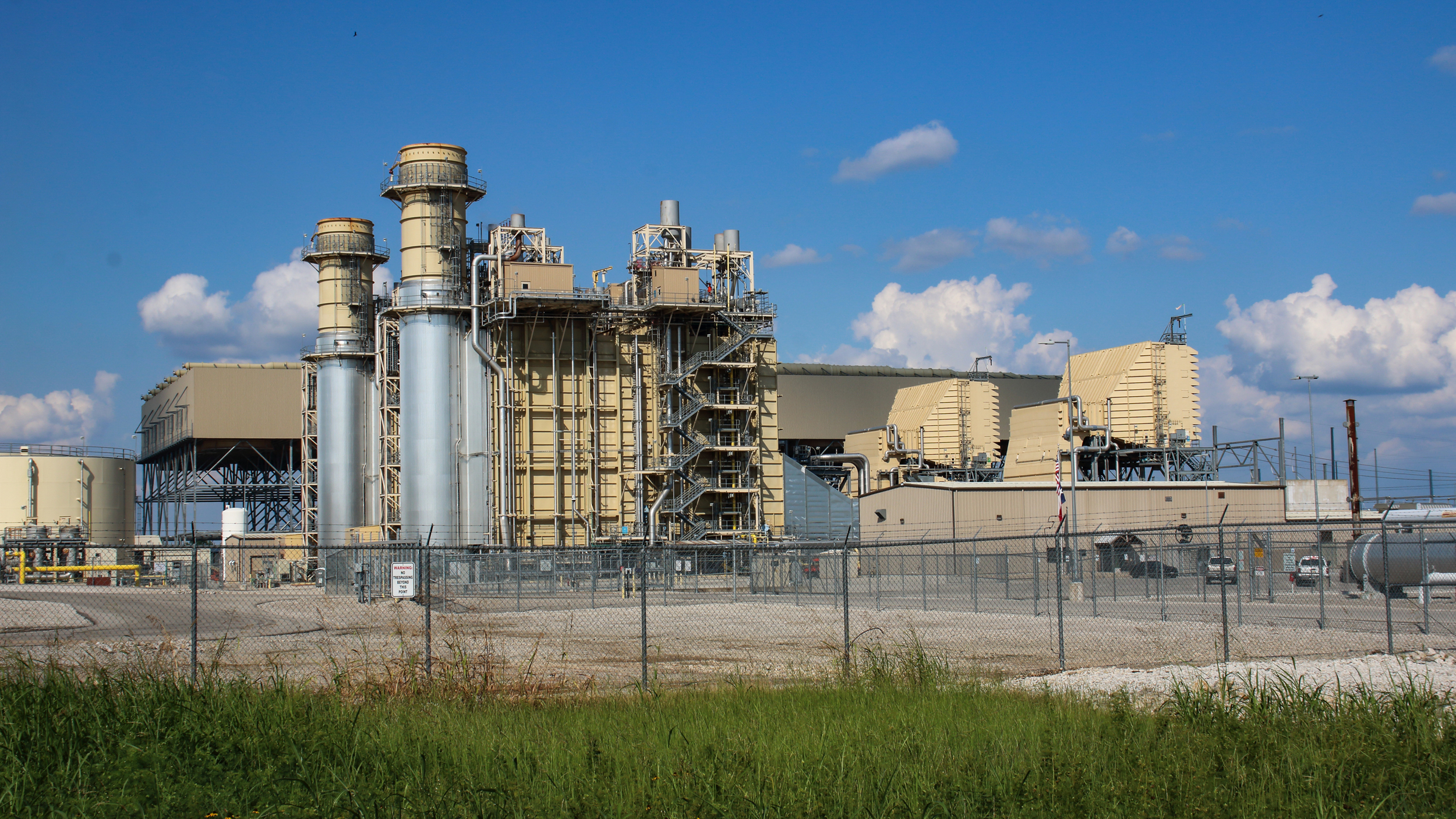 A view of the Wolf Hollow II power plant, owned by Constellation Energy, in Granbury. Credit: Keaton Peters/Inside Climate News
A view of the Wolf Hollow II power plant, owned by Constellation Energy, in Granbury. Credit: Keaton Peters/Inside Climate News
One of the companies applying for a loan is Constellation Energy, which owns the Wolf Hollow II power plant in Granbury. Constellation has an agreement with Marathon Digital, allowing Marathon to rent space next to the power plant for Bitcoin mining and purchase power directly from Wolf Hollow II.
Marathon has a capacity to use up to 300 megawatts of power, and Constellation wants to add additional turbines onto Wolf Hollow II capable of generating that much power.
In an application to the Texas Commission on Environmental Quality, Constellation said the power plant expansion would include eight turbines, and it applied for air permits to release more than 796,000 additional tons of carbon dioxide per year. Such massive greenhouse gas emissions have made cryptocurrency mining the focus of intense opposition by climate activists.
Bitcoin Can ‘Game the System’
The deal between Marathon and Constellation, known as a power purchase agreement, is part of what makes Bitcoin mines major players in the Texas energy market — not simply consumers of power. In most agreements, crypto facilities lock in a relatively low rate to purchase electricity “behind the meter,” so the supply does not enter the ERCOT market. But Bitcoin mining companies can later decide to sell that power to the rest of the grid through the ERCOT market, rather than powering their computers.
For example, Riot Platforms operates two of the largest existing Bitcoin facilities in the world, both located in Texas. The New York Times reported last year that Riot Platforms’ operation in Rockdale was the most power-intensive Bitcoin mining operation in the country, using “about the same amount of electricity as the nearest 300,000 homes.”
One of the facilities has been able to pay as low as 2.5 cents per kilowatt-hour of electricity, while the average price across Texas in 2022 was more than 10 cents.
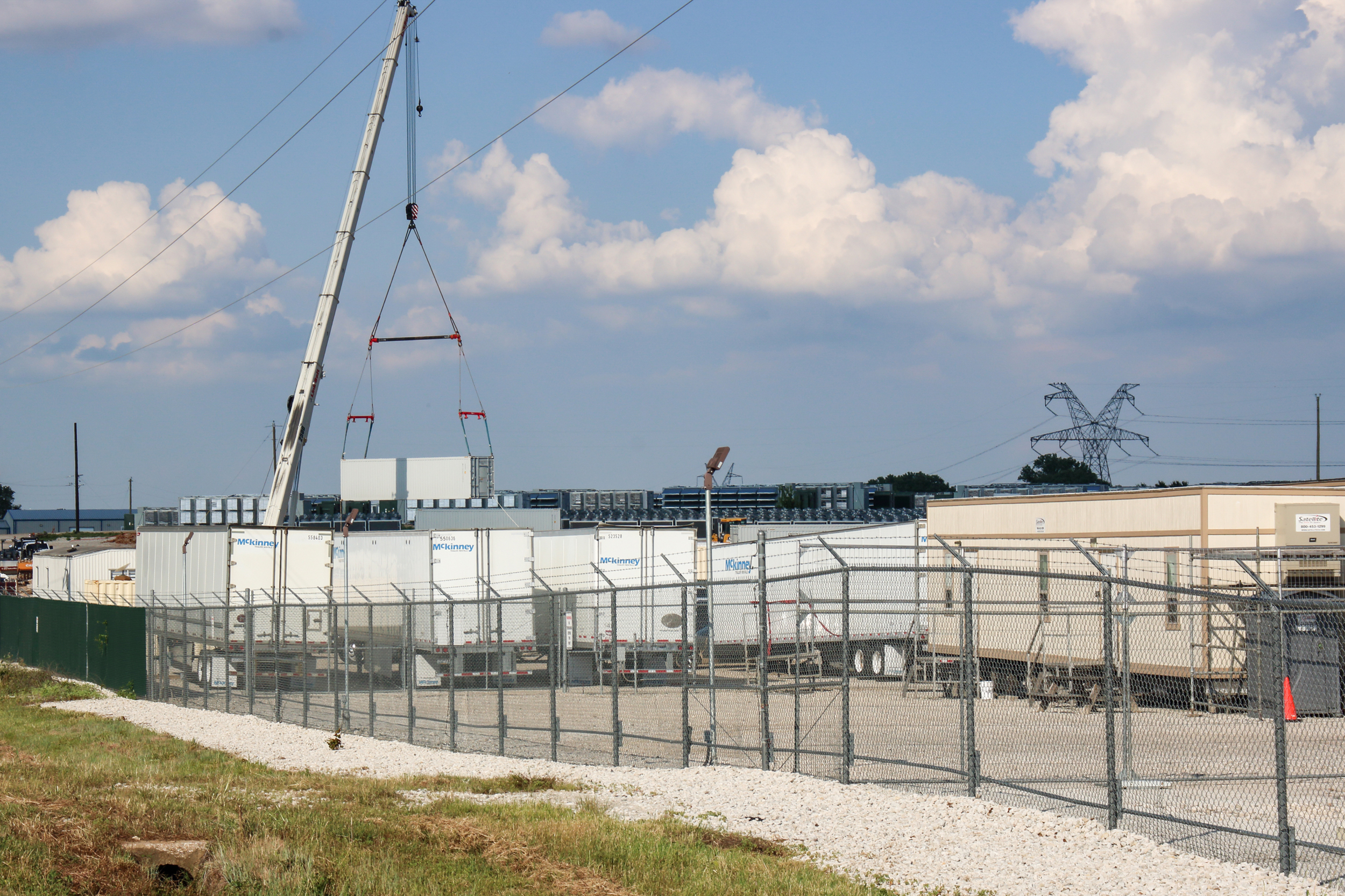 Trucks are parked alongside containers of computers owned by Marathon Digital at the Bitcoin mine in Granbury. Credit: Keaton Peters/Inside Climate News
Trucks are parked alongside containers of computers owned by Marathon Digital at the Bitcoin mine in Granbury. Credit: Keaton Peters/Inside Climate News
In August 2023, when energy prices were high amid scorching summer days, Riot Platforms made $24.2 million from reselling power purchased through their private agreements onto the wholesale energy market, almost tripling the $8.6 million the company made that month mining and selling Bitcoin.
“They can game the system in a few different ways for their profit,” said Mandy DeRoche, an attorney at the nonprofit Earthjustice, who has worked on cases involving crypto mines across the country.
Separately, Bitcoin companies can participate in demand response programs, in which the companies allow ERCOT operators to control the energy load of the facility and lower their usage to compensate for sudden outages or periods of high demand elsewhere on the grid. These situations arise most often during extreme weather. Companies get paid a premium by ERCOT for participating in demand response, and they get paid an additional fee each time their energy load is controlled through the program. Riot Platforms made $7.2 million from these programs in August 2023, according to a monthly earnings report.
“Texas has set up a system which allows crypto mining to be significantly advantaged,” said state Sen. Charles Schwertner (R-Georgetown), the chairman of the Business and Commerce Committee.
Those millions in profit don’t appear out of thin air, and consumer advocates are worried the burden falls on Texans such as Cheryl Shadden and her neighbors in Granbury. “The cost is passed directly on to ratepayers,” said Adrian Shelley, Texas director for the nonprofit Public Citizen. Bitcoin miners “are ideally positioned to manipulate the energy market in a way that will drive up prices for consumers.”
With three distinct ways to profit — energy-intensive computations to “mine” Bitcoin, selling power on the wholesale energy market or participating in demand response — each decision will impact the availability of energy for most of Texas. And which method miners choose is highly variable.
As DeRoche explains, “if the price of Bitcoin is fairly low, then there’s more incentive to turn off [their computers] in peak demand or in extreme weather.”
This year, the price of Bitcoin has soared to record highs and remained steadily around $60,000 since March, about twice as high as in August 2023. With the price up, DeRoche said it will be harder to predict whether miners will power down when energy becomes scarce.
A Phased Plan for Noise Pollution
From the industry perspective, Bitcoin advocates say the flexibility of mining operations makes the grid stronger. “We need more price sensitive loads on the grid, not less,” said Lee Bratcher, president of the Texas Blockchain Council, in an email to Inside Climate News. “By locating in rural areas with too much power and not enough transmission capacity to get that power to major population centers,” Bratcher said the cryptocurrency mining industry is using power that would otherwise go to waste.
He added that many mines operate at full capacity during the night when demand is low and power down “during high power demand times like during hot afternoons in the summer or winter cold snaps.”
Bratcher, as well as representatives from Marathon Digital and Constellation Energy, declined to be interviewed. In an email, Jim Crawford, chief operating officer for Marathon, also said that the company incentivizes wind and solar power generation by signing power purchase agreements with renewable energy generators.
This story is funded by readers like you.
Our nonprofit newsroom provides award-winning climate coverage free of charge and advertising. We rely on donations from readers like you to keep going. Please donate now to support our work.
“Without these commitments, many renewable energy projects might never reach completion,” Crawford said. Despite being located directly alongside a natural gas plant in Granbury, Marathon’s other facilities in Texas are located near wind power, and Crawford said, “we are contributing to the displacement of fossil fuel generation.”
However, DeRoche, who wrote a report on the industry that includes a section titled “Breaking Through the Bitcoin Myths,” points out that power purchase agreements “are all confidential and proprietary,” making it difficult to fact-check Bitcoin miners’ claims about renewable energy. “Many of these claims don’t hold water,” she said.
As for the concerns over noise in the Granbury area, Crawford said that in March, Marathon released a phased plan to reduce noise, but he is “unable to comment on this matter at this time.”
The phased plan started in April. It includes shutting off fans whenever computers are not being used and beginning the transition to liquid cooling, in which computers are immersed in a non-conductive liquid solution that silently absorbs heat.
A spokesperson for Constellation said in an email that they “have heard the community’s feedback about reducing noise” and are working with Marathon to solve the problem.
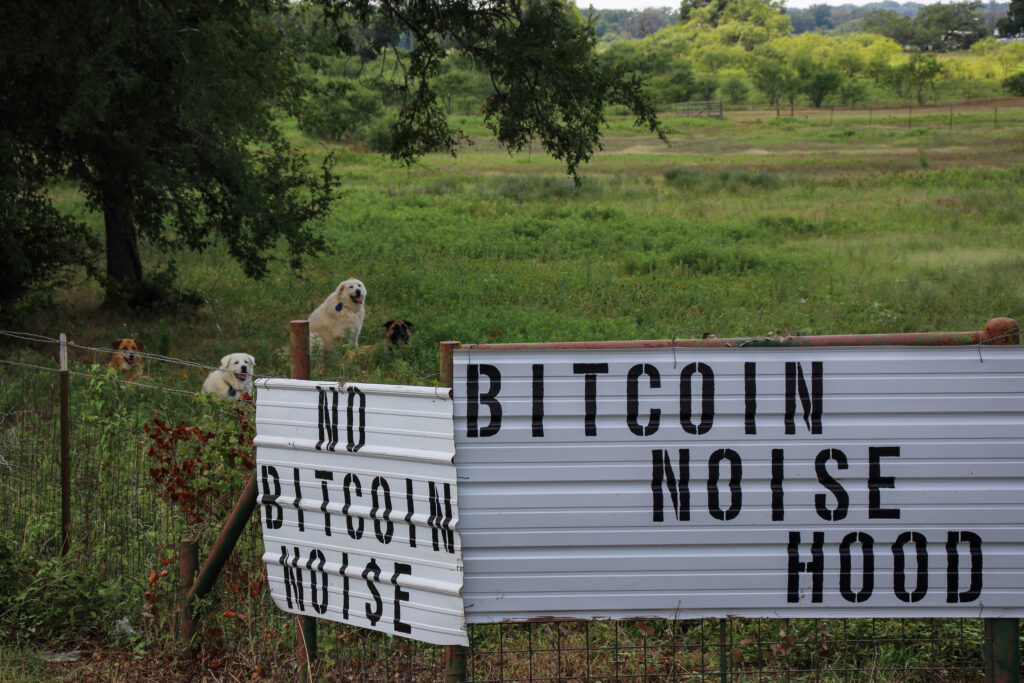 Signs are displayed on the fence of Cheryl Shadden’s property in Granbury, Texas. Credit: Keaton Peters/Inside Climate News
Signs are displayed on the fence of Cheryl Shadden’s property in Granbury, Texas. Credit: Keaton Peters/Inside Climate News
A wall on the east side of the Bitcoin facility where it borders a small community of mobile homes was built to dampen the sound. But Shadden, who lives northwest of the mine, said the sound reverberates off the wall, and depending on atmospheric conditions, neighbors miles away hear the noise. Even with first steps taken by Marathon, she said the noise is as bad as ever.
Local law enforcement has cited Marathon more than 30 times for violating noise limits above 85 decibels. From the edge of Shadden’s property, her neighbor measured 87.9 on a decibel reader the same day that the Senate hearing took place. Neighbors have talked to local elected officials, but they say there hasn’t been any significant action resulting from those meetings.
“You certainly get the impression that there’s people that see this is just a great, you know, money opportunity for the county, right? And the health issues they haven’t gotten too concerned about,” said Granbury resident John Highsmith.
Neighbors are also taking aim at the power plant, and have complained to Constellation, arguing that it is putting the community at risk by renting to the Bitcoin mine. Separately, they are preparing for a hearing with the state environmental regulator in the fall to challenge the company’s plans to increase air pollution by expanding the power plant. Hood County residents, including one of the county commissioners, have also been pressuring the county not to renew Constellation Energy’s tax abatement.
“This community has had enough,” Shadden said.
Bitcoin
‘This is huge’ — Billionaire Mark Cuban issues ‘incredible’ Bitcoin and crypto prediction amid price slump

Bitcoin has surged again this year under former President Donald Trump Cryptocurrency boosts US presidential election in November with ‘revolutionary’ plan.
The price of bitcoin has surged to more than its all-time high in recent months, surpassing $70,000 per bitcoin and triggering a wave of mega-optimistic predictions about the price of bitcoinalthough it fell again this week to below $65,000 after the Federal Reserve kept interest rates steady.
Now, as Elon Musk suddenly breaks his silence on bitcoin and cryptocurrenciesBillionaire investor Mark Cuban called a California plan to digitize 42 million car titles using blockchain an “incredible step forward” and “huge” for cryptocurrencies.
Sign up for free CryptoCodex now—A daily five-minute newsletter for traders, investors, and crypto curious people that will keep you up to date and ahead of the bitcoin and crypto bull market
Mark Cuban, famous Shark Tank investor and billionaire owner of the NBA team Dallas Mavericks, has… [+] called a cryptocurrency update “amazing” amid bitcoin’s price slump.
Getty Images
The California Department of Motor Vehicles (DMV) has digitized 42 million car titles using blockchain, it was reported by Reuters, through technology company Oxhead Alpha on the Avalanche blockchain and designed to detect fraud and facilitate the securities transfer process.
“This is an incredible development for crypto,” Cuban, best known as an investor on TV’s Shark Tank and owner of the Dallas Mavericks NBA team, posted on X, joking that U.S. Securities and Exchange Commission (SEC) Chairman Gary Gensler could sue the state as part of his hostility toward cryptocurrencies and blockchain technology.
“The reason this is huge for crypto is because people who hold the tokens will have an app with an Avalanche wallet,” Cuban said. “Tens of millions of Californians having and using a crypto wallet in the next five years, or however long it takes, normalizes the use of wallets and crypto.”
John Wu, president of Avalanche developer Ava Labs, told Reuters that California’s DMV is “creating a wallet that you can download on your phone.”
Sign up for CryptoCodex now—A free daily newsletter for the crypto-curious
Bitcoin’s price has rallied this year, triggering a wave of bullish bitcoin price predictions from… [+] people like billionaire Mark Cuban.
Forbes Digital Assets
Last month, Cuban predicted that if the US dollar falls as the global reserve currency, bitcoin could become “a global ‘safe haven’” and a “global currency.” potentially sending the price of bitcoin to a much higher level.
According to Cuban, bitcoin could become what its most ardent supporters “envision” — a means “of protecting our economies… This is already happening in countries facing hyperinflation.”
The price of bitcoin has skyrocketed over the past year, largely due to the world’s largest asset manager, BlackRock, leading a bitcoin attack on Wall Street.
Bitcoin
Large Bitcoin (BTC) Holders Added $5.4 Billion Worth of BTC in July, Data Shows
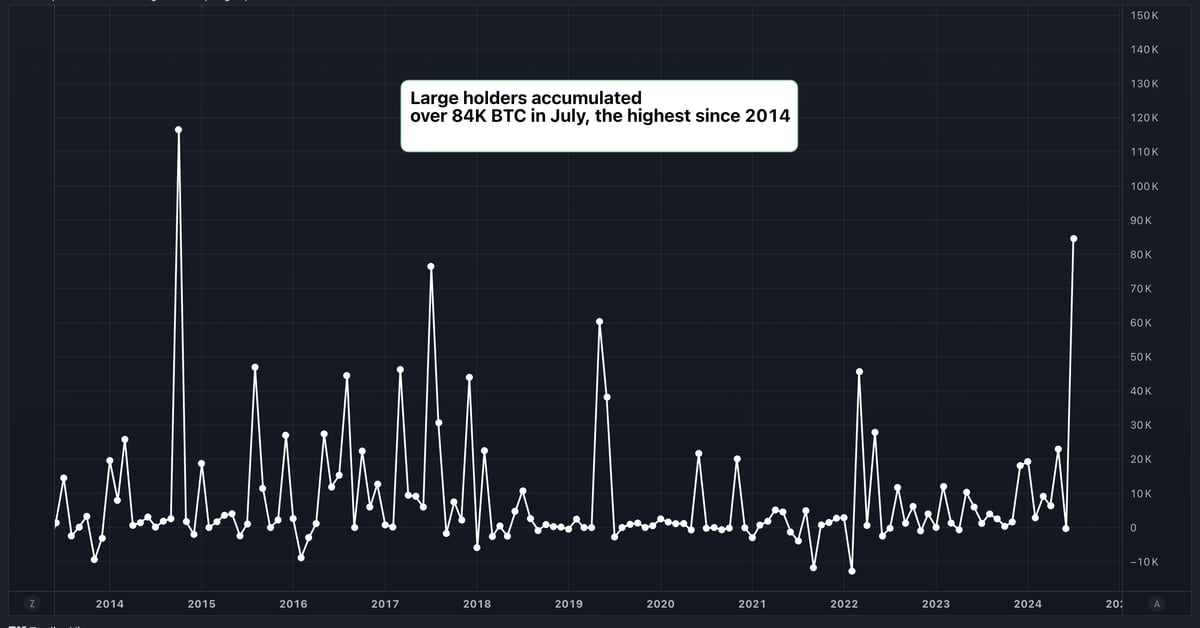
Please note that our Privacy Policy, terms of use, cookiesIt is do not sell my personal information Has been updated.
CoinDesk is a awarded media outlet that covers the cryptocurrency industry. Its journalists follow a strict set of editorial policies. In November 2023, CoinDesk has been acquired by the Bullish group, owner of Optimistica regulated digital asset exchange. The Bullish Group is majority owned by Block.one; both companies have interests CoinDesk has a portfolio of blockchain and digital asset businesses and significant holdings of digital assets, including bitcoin. CoinDesk operates as an independent subsidiary with an editorial board to protect journalistic independence. CoinDesk employees, including journalists, may receive options in the Bullish group as part of their compensation.
Bitcoin
Peter Schiff criticizes Michael Saylor’s Bitcoin hype by U.Today
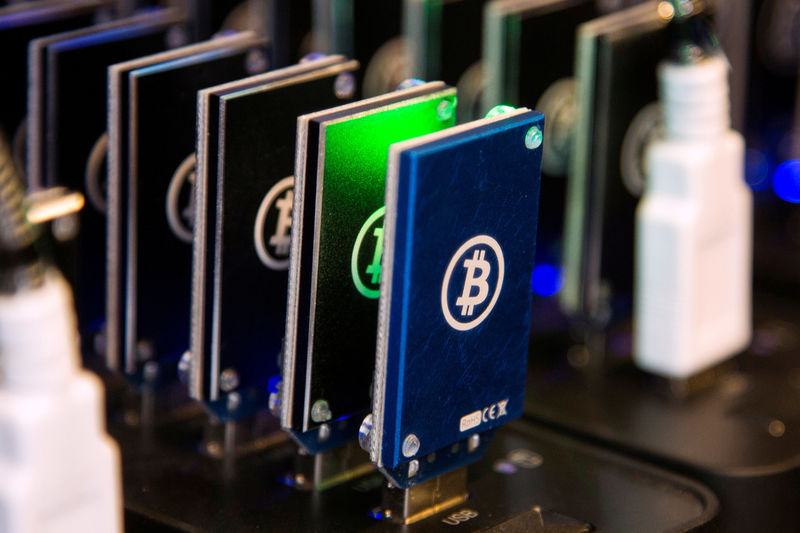
U.Today – Renowned economist and cryptocurrency critic Peter Schiff has criticized Michael Saylor’s recent hype about the growing adoption of cryptocurrencies as a strategic treasury asset by corporations.
Michael Saylor, a well-known Bitcoin advocate and president of MicroStrategy, recently shared his enthusiasm on X about the growing adoption of Bitcoin as a strategic treasury asset.
Citing a comment made by Bitcoin investor Bill Miller in a recent interview with CNBC, Saylor tweeted: “We now have more companies coming forward and saying we will put Bitcoin on our balance sheet as a strategic treasury asset.”
However, not everyone shares Saylor’s enthusiasm. Schiff, a vocal Bitcoin critic and gold bull, was quick to respond with his usual skepticism. In a pointed tweet, Schiff argued: “Bitcoin is neither strategic nor appropriate as a treasury asset. Companies should not risk shareholder funds. They should pay dividends and let shareholders risk their own money.”
Bitcoin enthusiasts are not intimidated
However, Schiff’s criticism shouldn’t deter Bitcoin enthusiasts, who often take Schiff’s words with a pinch of salt. To put things in context, Michael Saylor began buying Bitcoin in 2020 as an inflation hedge and alternative to money. Saylor’s company, MicroStrategy, is among the largest public holders of Bitcoin in the world. As of June 20, it held 226,331 BTC, purchased for around $8.33 billion at an average price of $36,798.
Over the weekend, Schiff was surprised when 87% of the more than 11,000 Bitcoin holders who responded to his X survey said they would not sell any of their Bitcoin even if the price dropped more than 99% to $120. They said not only would they not sell, but that they would continue to buy even when prices dropped.
Schiff unexpectedly revealed that “the main selling point for investors to buy Bitcoin is its excellent past performance record.”
At the time of writing, Bitcoin is trading at $66,067, having reached all-time highs of nearly $74,000 in mid-March.
Bitcoin
Bitcoin Falls as ETF Flows Reverse, Mt. Gox Moves Billions

In a week of drastic fluctuations, the price of Bitcoin (BTC) has retreated from its highs and is currently trading at US$66,250, down 0.9% in European trading.
This volatility comes on the heels of a significant surge above $70,000 earlier in the week, fueled by former President Donald Trump’s ambitious cryptocurrency plans announced in a Bitcoin Conference in Nashville.
Trump’s announcement to fire Securities and Exchange Commission Chairman Gary Gensler and establish a strategic Bitcoin reserve if elected president has temporarily sent the cryptocurrency market into a frenzy.
However, the excitement was short-lived as a series of events unfolded which caused investor sentiment to sour.
A significant sell-off of about 8% was triggered when the US Marshals Service moved $2 billion in Bitcoin for new wallets.
This move has reignited fears of a potential large-scale liquidation, compounded by lingering concerns over a possible Bitcoin liquidation from Mt. Gox. Early this morning, Mt. Gox administrator transferred US$2.2 billion value of your BTC assets in a new wallet.
Meanwhile, the US Bitcoin ETF spot market is showing signs of fluctuation, according to data from SoSo Value. On July 30, Bitcoin spot funds experienced their first net outflow in five days, totaling $18.3 million.
The Grayscale Bitcoin Trust (GBTC) saw outflows of $73.6 million, while the BlackRock iShares Bitcoin Trust (IBIT) attracted $74.9 million in inflows. But outflows from other funds left the category in the red at the end of Tuesday’s trading session. The total net asset value of spot Bitcoin ETFs currently stands at a substantial $58.5 billion.
In other crypto news, Ripple (XRP) is up 8.6% in the past 24 hours, hitting over 64 cents – its highest point since March 25, according to CoinGecko. data.
This rally comes amid a scheduled token unlock and growing optimism around a potential deal in the long-running SEC vs. Ripple lawsuit.
The crypto community is closely watching the SEC’s actions, particularly its intention to amend its complaint against Binance regarding “Third-Party Cryptocurrency Securities,” which some interpret as a positive sign for Ripple.
On a market analysis noteSingapore-based cryptocurrency trading desk QCP Capital wrote that while election headlines continue to dominate, several crucial macroeconomic events loom on the horizon.
“Election headlines will continue to be a key focus, but several key macroeconomic events are also on the horizon. Key events starting with the FOMC meeting on Wednesday, megacap tech earnings (Apple, Amazon, Meta) throughout the week, and unemployment data on Friday,” QCP Capital wrote.
Edited by Stacy Elliott.
-

 Regulation7 months ago
Regulation7 months agoRipple CTO and Cardano founder clash over XRP’s regulatory challenges ⋆ ZyCrypto
-

 Regulation5 months ago
Regulation5 months agoNancy Pelosi Considers Supporting Republican Crypto Bill FIT21 – London Business News
-

 Videos6 months ago
Videos6 months agoCryptocurrency News: Bitcoin, ETH ETF, AI Crypto Rally, AKT, TON & MORE!!
-

 Regulation6 months ago
Regulation6 months agoBitcoin’s future is ‘bleak’ and ripe for regulation, says lead developer
-

 News6 months ago
News6 months agoThe trader earned $46 million with PEPE after reaching a new ATH
-

 Blockchain6 months ago
Blockchain6 months agoSolana ranks the fastest blockchain in the world, surpassing Ethereum, Polygon ⋆ ZyCrypto
-

 Blockchain6 months ago
Blockchain6 months agoSolana Surpasses Ethereum and Polygon as the Fastest Blockchain ⋆ ZyCrypto
-

 Regulation6 months ago
Regulation6 months ago🔒 Crypto needs regulation to thrive: Tyler Cowen
-

 Videos6 months ago
Videos6 months agoWho Really CONTROLS THE MARKETS!! Her plans REVEALED!!
-

 Videos7 months ago
Videos7 months agoKucoin safe?? Exchange REVIEW and beginner’s guide!!
-

 Blockchain6 months ago
Blockchain6 months ago“Liquid vesting” is an oxymoronic feature of blockchain that allows early investors to sell without waiting
-

 Videos6 months ago
Videos6 months agoInstitutions purchasing MEMECOINS?! Everything you need to know!






